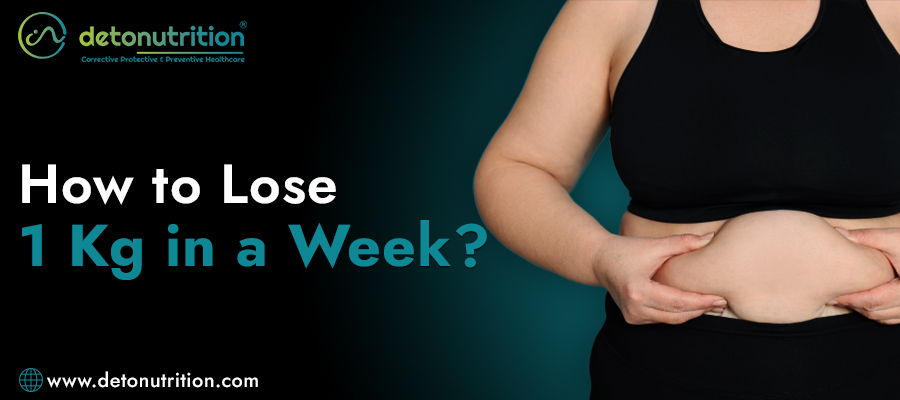How To Lose 1 Kg In A Week?
The quest for a slimmer physique often leads us down paths promising quick fixes. But when it comes to weight loss, slow and steady truly wins the race. While losing 1 kg in a week might seem appealing, it's important to understand the healthy and sustainable ways to achieve this goal. Let’s understand how.
Why Slow and Steady Wins the Race
Crash diets and extreme calorie restriction might lead to rapid weight loss initially, but they're rarely sustainable. These drastic measures often trigger the body's "starvation response," leading to a metabolic slowdown and making it harder to lose weight in the long run. Additionally, they can lead to nutrient deficiencies, fatigue, and muscle loss, compromising your overall health. Aiming for a gradual weight loss of 0.5 to 1 kg per week allows your body to adapt effectively. This sustainable approach promotes long-term success and minimizes the risk of regaining weight.
Read This Article - What Makes L Carnitine Best For Weight Loss Benefits Best Supplements Dosage
A Calorie Deficit Diet: The Key to Weight Loss
To enable fat loss which results into weight loss, one needs to create a calorie deficit. This means burning more calories than you consume each day. To lose 1 kg in a week, you'd need a deficit of roughly 7,700 calories (as 1 kg of fat equals approximately 3,500 calories).
Crafting a Sustainable Calorie Reduction Plan
Here's where a healthy approach shines:
1. Calculate Your Baseline:
The first step is to determine your daily calorie needs for maintaining your current weight. This can easily be done using readily available online calculators or consulting a dietitian.
2. Create a Moderate Deficit:
Aim for a deficit of 500-1000 calories per day. This ensures gradual weight loss while providing your body with the essential nutrients it needs to function optimally.
3. Focus on Quality, Not Quantity:
When reducing calorie intake, prioritize nutrient-dense foods like fruits, vegetables, whole grains, lean protein, and healthy fats. These keep you feeling full and provide the vitamins, minerals, and fiber your body needs.
Supercharge Your Weight Loss with Exercise
Exercise complements your calorie-reduction plan by boosting your calorie expenditure. Here are some effective ways to integrate exercise into your routine:
1. Cardio:
Aim for at least 150 minutes of moderate-intensity cardio or 75 minutes of vigorous-intensity cardio per week. Activities like brisk walking, jogging, swimming, and cycling are excellent choices for weight loss.
2. Strength Training:
Don't neglect strength training! Building muscle mass not only increases your metabolism and helps you burn more calories at rest, but it also helps sculpt a toned physique. 2-3 strength training sessions per week while focusing on major muscle groups should be good enough.
3. NEAT (Non-Exercise Activity Thermogenesis):
Don't underestimate the power of daily activities! Taking the stairs instead of the elevator, parking farther away from your destination, and keeping yourself on the move throughout the day can all contribute to increased calorie burning. Completely avoid sedentary lifestyle choices.
Smart Eating Strategies for Sustainable Weight Loss
Below are practical tips to help you manage your calorie intake effectively:
1. Mindful Eating:
Pay attention to hunger and fullness cues. Eat slowly and savor your food, allowing your body enough time to register satiety signals. Health supplements can play a critical role in enabling this, as some of the ingredients in them such as L carnitine, suppresses hunger cravings. Detonutrition’s Rapid Fat Loss Combo can be the perfect fit for you.
2. Portion Control:
Use smaller plates, measure out portions, and avoid distractions while eating to prevent overconsumption.
3. Plan Your Meals:
Planning your meals and snacks in advance helps you make healthy choices and avoids unhealthy impulse decisions.
4. Stay Hydrated:
Drinking plenty of water throughout the day keeps you feeling full and reduces cravings. Aim for 8-10 glasses per day.
5. Read Food Labels:
Understanding portion sizes and calorie content empowers you to make informed choices.
6. Limit Processed Foods:
Processed foods are often loaded with calories, unhealthy fats, and added sugars. Opt for healthier meals by choosing whole, unprocessed foods.
Read This Article - Reasons Why Am I Not Losing Weight
Beyond the Scale: Embracing a Healthy Lifestyle
The numbers on the scale do not define a sustainable weight loss journey. It's about cultivating healthy habits that improve your overall well-being. Here are some additional tips:
1. Get Enough Sleep:
When sleep-deprived, your body produces more ghrelin (the hunger hormone) and less leptin (the satiety hormone), leading to increased cravings and difficulty losing weight. 7-8 hours of quality sleep every night is a must.
2. Manage Stress:
Chronic stress can elevate cortisol levels, a hormone that promotes fat storage. Practice stress-management techniques like yoga, meditation, or deep breathing exercises.
Addressing Challenges and Plateaus
Even with the best intentions, setbacks and plateaus are inevitable. Here's how to navigate them:
1. Re-evaluate Your Goals:
Regularly reassess your goals and adjust your calorie intake or exercise routine if needed. Seek guidance from a registered dietitian or certified personal trainer as and when required.
2. Track Your Progress:
Keeping a food diary or using a weight loss app can help you stay accountable and identify areas for improvement.
3. Celebrate Non-Scale Victories:
Celebrate improvements beyond the weighing scale when you realise rise in energy levels, increased strength, and better fitting clothes to stay motivated.
4. Embrace Patience:
Remember, sustainable weight loss is a journey, not a destination. Be patient with yourself and focus on building healthy habits that you can maintain for the long term.
Read this article - DEBUNKING "MAGIC BULLET" BELLY FAT BURNERS & THE ROLE OF BEST WEIGHT LOSS SUPPLEMENTS
The Power of Community: Building Support Systems
Surrounding yourself with positive influences can make a significant impact on your weight loss journey. Here are some ways to build a supportive community:
1. Join a Support Group:
Connecting with others who share similar goals can provide encouragement and valuable advice. Online support groups or local weight loss programs can be excellent options.
2. Tell Your Loved Ones:
Sharing your goals with friends and family can help you stay accountable. Their encouragement and understanding can be a powerful motivator.
3. Find a Fitness Buddy:
Working out with a friend or family member can make exercise more enjoyable and help you stay motivated.
Bonus Tip: Optimizing Your Kitchen for Weight Loss
Here are some final pointers to make your kitchen a weight-loss ally:
1. Stock Up on Healthy Staples:
Keep fruits, vegetables, whole grains, lean protein, and healthy fats readily available for healthy meals and snacks.
2. Limit Temptation:
Remove processed foods, sugary drinks, and unhealthy snacks from your pantry and refrigerator to avoid temptation.
3. Prepare Meals in Advance:
Prepping healthy meals and snacks in advance helps you make healthy choices on busy days.
4. Invest in Reusable Water Bottles:
Having a reusable water bottle with you throughout the day serves as a reminder to stay hydrated, which can curb cravings. By incorporating these strategies into your daily routine, you can shed that kilo in a healthy and sustainable manner, paving the way for a healthier and happier you!
Relevant article:- Reasons Why Am I Not Losing Weight
Conclusion: Sustainable Weight Loss
Losing 1 kg in a week can be achievable through a combination of moderate calorie reduction, regular exercise, and healthy lifestyle habits. By prioritizing your well-being over quick fixes, you'll be setting yourself up for long-term success. Remember, weight loss is a marathon, not a sprint. Embrace the journey, celebrate your progress, and enjoy the positive changes you'll experience along the way.





